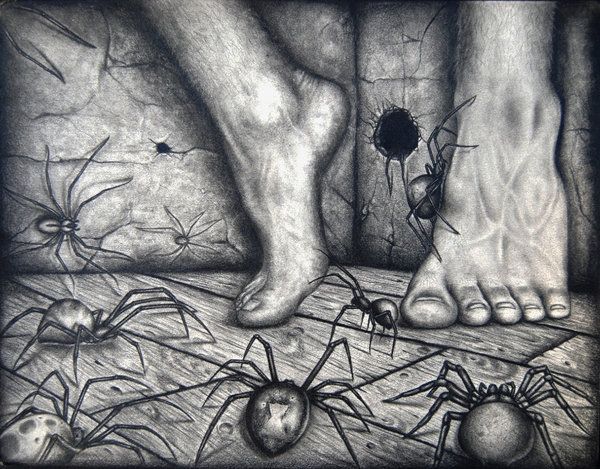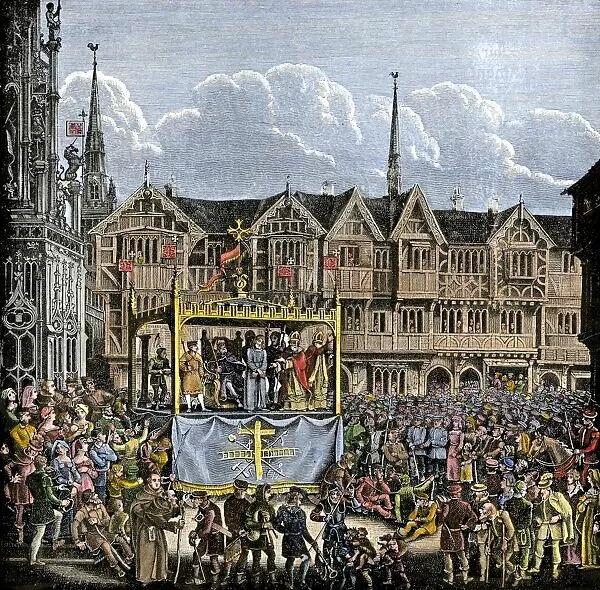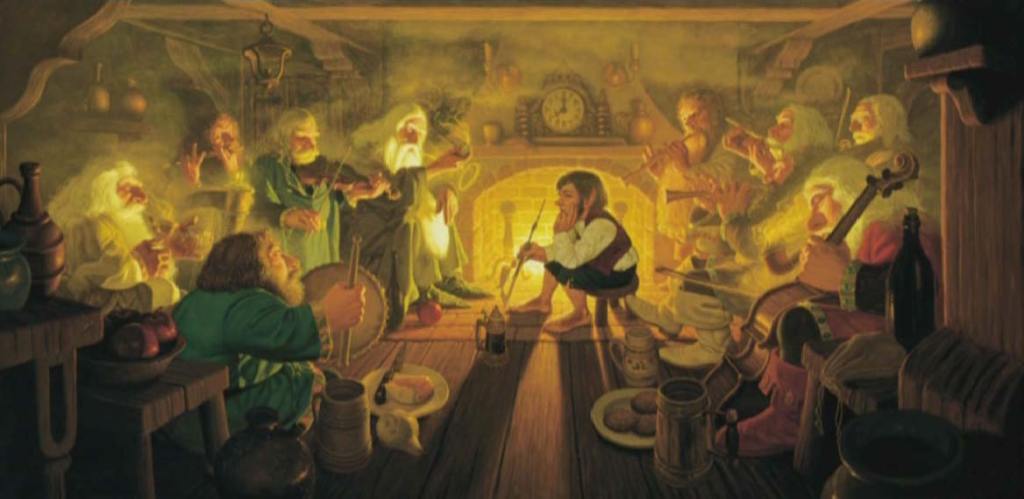As ever, welcome, dear readers.
The Italian phrase which forms the title of this posting can have an ironic ring: “Lucky old you!” but beato in itself, can have a more positive meaning: “extremely happy”—and it has another meaning yet, “blessed”.
As is the case with the majority of Italian words, this is based upon a Latin original, from the verb beo, which, like the modern Italian adjective derived from it, has several meanings: “to make happy, to bless,” even “to enrich” (which means that the adjective can mean not only “blessed/happy”, but can also mean “well-off”). The form from which the Italian adjective comes is the PPP—the perfect passive participle—meaning that the adjective really means something like “having been blessed/having been made happy/having been made rich”, suggesting an outside agent.
This idea of blessing/being blessed has been in my mind recently for two reasons.
First, we know that The Lord of the Rings appears empty of virtually all signs of religion: no priests, worshippers, temples, shrines—all of the things which, for Tolkien the medievalist, would have been everywhere in the medieval English world upon which Middle-earth is loosely based. Chaucer’s (c.1342-1400) Canterbury Tales

(from the beautiful early 15th century Ellesmere Manuscript—you can page through it here: https://hdl.huntington.org/digital/collection/p15150coll7/id/2838 )
alone has 10 figures connected with the Church (the Prioress, the Second Nun, the Nun’s Priest, the Monk, the Friar, the Parson, the Summoner, the Pardoner, and the Canon—along with the Canon’s Yeoman).
And yet, at least twice, we find this:
“But you shall go now with my blessing upon you, and upon all your people…He embraced the hobbits then, after the manner of his people, stooping, and placing his hands upon their shoulders, and kissing their foreheads.” (The Two Towers, Book Four, Chapters 6 and 7, “The Forbidden Pool”, “Journey to the Cross-roads”)
and:
“ ‘Gladly will I take it,’ said the king; and laying his long old hands upon the brown hair of the hobbit, he blessed him.” (The Return of the King, Book Five, Chapter 2, “The Passing of the Grey Company”)
In the first of these, Faramir is speaking to Frodo and Sam before they set off on their journey into Mordor, and, in the second, Theoden is speaking to Merry, who has just offered him his service.
I imagine that JRRT got the idea of such behavior from his religious upbringing and adult faith, as well as from the medieval religious tradition he spent time in the midst of in his scholarly pursuits.

It’s interesting however, that, in a Middle-earth ostensibly without religion (except for the calling upon the Valar in The Two Towers, Book Four, Chapter 4, “Of Herbs and Stewed Rabbit”, and the custom of looking to the west at mealtimes, which Faramir and his men practice—The Two Towers, Book 4, Chapter 5, “The Window on the West”, and that moment in dealing with Shelob, when Sam calls upon Elbereth, The Two Towers, Book Four, Chapter 10, “The Choices of Master Samwise” ), this act, which still appears in most contemporary world religions, has survived. In general, the idea is that, if a believer uses a gesture or words to convey a blessing,

he/she is conveying a wish that the person blessed will actually receive the fruits of that blessing from a divine figure. I don’t see any evidence in the text that this is true for Faramir or Theoden, but Tolkien says of the people of Middle-earth:
“For help they may call on a Vala (as Elbereth), as a Catholic might call upon a Saint…But this is a ‘primitive age’: and these folk may be said to view the Valar as children view their parents or immediate adult superiors, and though they know they are subjects of the King he does not live in their country nor have there any dwelling.”(draft of a letter to Peter Hastings, September, 1954, Letters, 193)
Is it possible, then, that, although they don’t mention such a figure, by the very act of blessing, Faramir and Theoden are implying that such a figure stands behind the words and gesture?
Something similar seems to be going on in Section IV of W.B. Yeats’ (1865-1939)

complex late poem, “Vacillation”, first published in 1932–
“IV
My fiftieth year had come and gone,
I sat, a solitary man,
In a crowded London shop,
An open book and empty cup
On the marble table-top.
While on the shop and street I gazed
My body of a sudden blazed;
And twenty minutes more or less
It seemed, so great my happiness,
That I was blessèd and could bless.”
Yeats mentions no divine figure behind his feelings, but we see him here in the roles both of Faramir and Theoden, those blessing, and of the various hobbits, those blessed.
But I wrote that I had two reasons for thinking about blessing. The one was my interest in The Lord of the Rings. My second is more personal. My beloved Bernese Mountain Dog, Bellerophon, died recently at 9 (old age for many Berners),

and, while I feel blessed at having had him as a companion for all of those years, I also feel that I should somehow bless him as a kind of thank-you for being the quiet and pleased with the world and everything in it friend he always was. May the Valar be kind to him.
Thanks, as ever, for reading.
Stay well,
Love and bless whatever pet you may have, from goldfish to elephant,
And remember that, as always, there’s
MTCIDC
O



























































